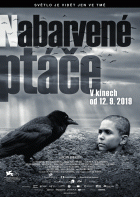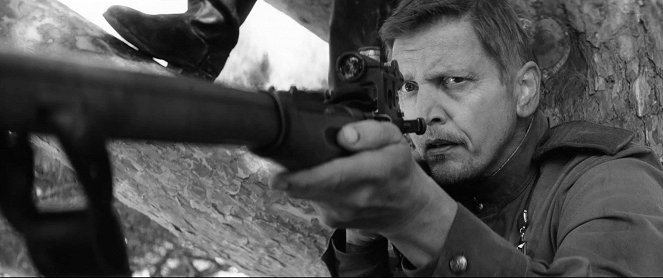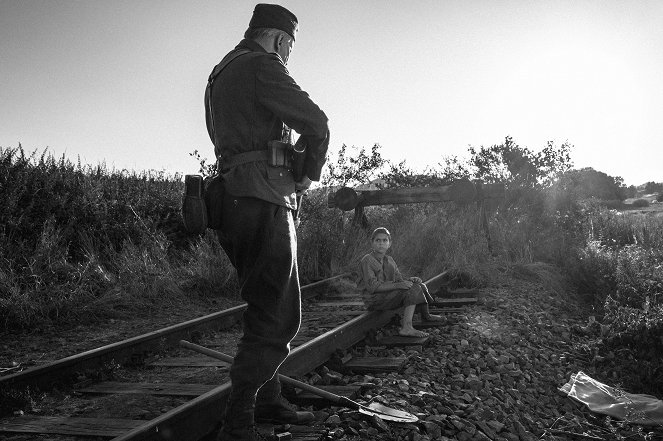Directed by:
Václav MarhoulScreenplay:
Václav MarhoulCinematography:
Vladimír SmutnýCast:
Petr Kotlár, Udo Kier, Michaela Doležalová, Zdeněk Pecha, Lech Dyblik, Jitka Čvančarová, Stellan Skarsgård, Harvey Keitel, Julian Sands (more)VOD (1)
Plots(1)
Trying to protect their child from the mass extermination of Jews, a Jewish couple sends their son to a relative in the countryside somewhere in Eastern Europe. However, the boy's aunt dies unexpectedly and the child is forced to set out on a lone journey through the wild and hostile world governed only by local rules, prejudices and superstitions. When the war ends, his fight for physical survival is replaced by a different kind of a fight. A battle he may not even be aware of, a battle with himself, a battle for his soul, his future... (Bioscop)
(more)Videos (4)
Reviews (11)
The Painted Bird is undoubtedly an ambitious filmmaking project eyeing festival awards, as evidenced by its strong theme and international cast. I welcomed the black-and-white visuals, which (as was once the case with Psycho) reduced the violence and atrocities presented by the absence of colour. I was intrigued by the episodic nature of the film, in which the young and initially innocent child protagonist meets various characters on his 'journey home' who influence, mark or corrupt him in different ways. By Czech standards, this is without question a supremely raw film featuring pervasive violence against humans and animals and an inhospitable landscape full of suffering, hopelessness and sadness. Of the individual episodes, the ones that stick out in my mind the most are those with the shameless Jitka Čvančarová, the transport of the Jews and the raid on the village. Although the film is nearly three hours long, it went by really fast in the cinema. As noted, the film lacks music alongside the colours - unless you counts the church scenes and the subtitles – which is a bit of a shame, as there is little dialogue and the music could have filled in and enhanced these quiet spots.
()
I think the controversy over The Painted Bird is largely an inflated bubble, and I think those leaving audiences in Venice were leaving mainly because they were bored and it wasn't the film for them, it's just that when someone asked them the reason, they just didn't want to be embarrassed and made excuses for the unbearable brutality and that was that. I'm not saying the film is a pleasant spectacle, it's certainly not, but it's a great spectacle and Václav Marhoul has a point. So while there are ugly things happening on screen, there's almost never a need to show them directly in an attempt to shock as much as possible; many times the silence before the storm is even more uncomfortable, or the mere sound of something just happening out of frame. Perhaps what I like most about The Painted Bird, though, is that it's entirely a world film, even though it doesn't try to be one. It’s not exhibitionistic, it remains focused on telling the sordid tale of a journey from darkness to light, aided by excellent actors as much as by Vladimír Smutný's breathtaking cinematography and Marhoul's beauteous direction. It's not for everyone, but that's okay.
()
In terms of technical aspects, filmmaking and production values, Marhoul's masterpiece is a film of world-class level. Considering what has been produced in our country for the last 30 years, considering how miserable it is, this film has absolutely no comparison and the whole Czech post-revolutionary cinema is following it with its tongue hanging out like a exhausted dog. But I have one problem with it, or rather with its source material. The reason it didn't even tickle me emotionally at all is the fact that I didn't believe the sincerity of the message. You know, Jerzy Kosinski was a bit of an exhibitionist. He loved the spotlight, he loved to be talked about, and he just kind of showed off in his flagship work. The film commendably doesn't try to shock at all costs, rather it keeps a low profile, but it couldn't leave out some key scenes. So here too, as in the book, they are playing for effect. We see gouged eyeballs rolling on the ground, rape with a bottle, sex with an animal (but it should be noted that the camera takes it as subtly as possible) and even the restrained scene with the sniper and the cruel disposal of the paedophile is actually playing for effect in a way. Nothing happens naturally, I just didn't believe it, and emotionally it left me cold. Kosinski (and therefore the film) took a stereotypical approach to female characters, the two major female characters are both sexually disturbed aggressive nymphomaniacs, but at least he left the auntie out of it (big smiley face). Okay, I just have a big problem with the book, but not with the film in principle. Anyway, that cinematography! It’s world-class, really world-class. Every shot is thought out to the smallest detail, the beautiful long-shot compositions (in the bottom shot of Čvančarová walking naked in forest meadow you can clearly see Marhoul's inspiration from Alexandria in Marketa Lazarová) alternate with interior shots where it’s a joy to watch the play of light and shadow, simply beautiful. In fact, it wasn't until the end that I realized that there wasn’t any music and yet it didn't matter. That is also an art, to tell a story only in pictures, and here I give Marhoul a thumbs up. Aside from the final "chapter" when the boy gets to the civilized world and the narrative gets a bit bogged down and tedious, the film flew by very quickly. The pace is slow but engaging, so the three hours felt like an hour, and that's also a good report card for Marhoul. I'm glad I watched it, but I'm also glad I'm clear about which book I don't want in my collection PS: But I'm gonna take a crack at Marhoul anyway. He openly acknowledges Klimova's Come and See as a source of inspiration, also thanks to the presence of Alexei Kravchenko in one of the smaller roles. But when I compare little Kravchenko and Petr Kotlár, it's like heaven and smoke. At the end of Klimov's film, Kravchenko is a little old man, a boy with grey hair on whom the hardships of the war were indelibly and forever etched. Kotlár, in contrast, is so pudgy at the end, his face shows no hint of any hardship, he might as well sign up for some child modeling. So here I had a big problem with authenticity and the assurance that Come and See is simply on another weight category; in boxing terminology a Russian heavyweight vs a Czech Welterweight :o)
()
(less)
(more)
I don’t watch Czech films these days, they don’t interest me and I don’t see in them anything original and authorial in terms of style and narration (when I happen to stumble upon them on TV). The Painted Bird is not the revolutionary and morally questionable movie the initial responses made us believe, but it’s nonetheless honest, intimate and thoughtful filmmaking of the kind other domestic productions can not match. There have been comparisons with Tarkovsky or Markéta Lazarová, but I wouldn't go that far; Marhoul is more sober and more naturalistic, and also more accessible from a narrative standpoint. The black and white composition is an understandable and correct step for such bleak material, while the taciturnity combined with the overuse of details and the sparse editing allow for a deeper immersion of the viewer in the atmosphere so they can be ready to react with empathy to all the horrors in front of them, which the camera tastefully hides most of the time, so the story will not feel gratuitously violent. The narration consists of simply intertwined episodes with the unifying motif of the complex development of the protagonist – complex only in the sense that each chapter shapes a different side of Jošek's personality and gives him experiences that help him grow up in that terrible environment without real love. Otherwise, the development is not too surprising, Marhoul relies mainly on changing of moral environments, which take second place to the objective statements of the cruelty of war, the misery associated to it and the religious fanaticism of the predominantly rural civilians. It is a pity that in the episodic structure this secondary function gradually becomes stronger than the repeated suffering of the main character. Overall, however, I must praise it, The Painted Bird looks beautiful, it doesn’t get boring despite its runtime and the repetitiveness, the performances and the casting of the repulsive village folk are perfect (even I could have had a small role), and it presents big ideas and a cruel vision of human nature with a strong author’s signature (though I couldn’t avoid laughing when I heard the Wilhelm Scream when someone fell off a horse). A case of impressive filmmaking that may not have that huge an impact on savvy viewers despite its great ambitions, but that with every shot and scene it screams that it should be taken seriously here and abroad – and that, fortunately, it doesn’t get too annoying even after two hours.
()
Ideally, Czech cinematography should have a big, ambitious film like this at least a couple of times a year, so one The Painted Bird wouldn’t get such an aura. But we don’t have that and with this work Marhoul is objectively several streets head of any recent Czech competition, and they simply can’t catch him. A great and stylish film, world-class. I didn’t enjoy it enough for a five-star rating because it’s not really possible to “enjoy” it. It is exhausting, rather. But a well earned four starts, without any doubt. Now, to create a media aura around this film as if it was some sort of exploitation war horror movie is incredibly absurd. Sure, there are some horrible and monstrous things, but Marhoul approaches them with a lot of decency, with chastity almost. And if the hysterical responses from Venice are anything to go by, it's just that the snobs from these big festivals like to fall into cheap headlines ... and that crap will last.
()



Ads